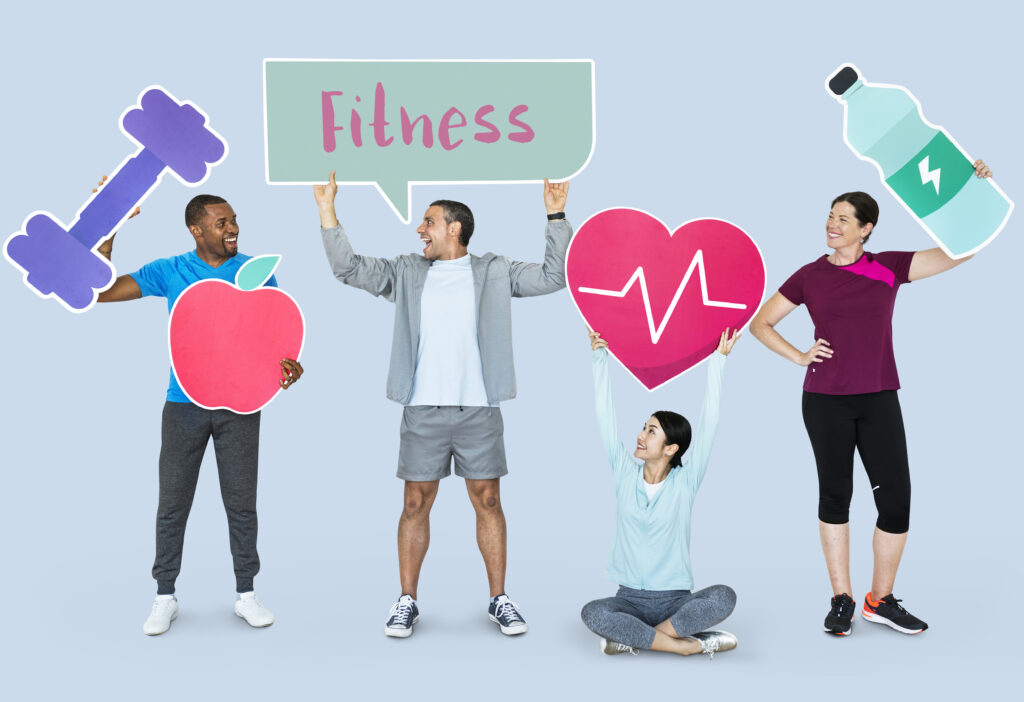
Table of Contents
Introduction
More than just a fad, physical fitness is a lifestyle that can improve your general wellbeing. Setting an emphasis on physical fitness is essential in a time when fast food and sedentary lifestyles are prevalent. This blog discusses the numerous advantages of physical exercise and provides helpful advice to get you started on your fitness journey.
The Importance of Physical Fitness
Being physically healthy allows you to feel great and live your best life, not just look attractive doing it.Here are some strong arguments in favour of making physical fitnessa top priority.
Improved Health:
Regular physical activity reduces the risk of chronic diseases such as heart disease, diabetes, and certain cancers. It also helps maintain healthy blood pressure and cholesterol Regular exercise lowers the risk of developing chronic diseases such as diabetes, heart disease, and some types of cancer. Additionally, it aids in keeping cholesterol and blood pressure at normal ranges.
Enhanced Mental Health:
The “feel-good” hormones endorphins, which are released during exercise, can help reduce stress, anxiety, and sadness. It improves your mood and fosters focus.
Weight Management:
In terms of weight management, physical fitness is crucial. You can achieve and maintain a healthy weight by combining exercise with a well-balanced diet.
Increased Energy Levels:
Regular physical activity boosts your energy levels and reduces fatigue. You’ll find yourself more alert and productive throughout the day.
Stronger Immune System:
Exercise increases the ability of your immune system to fight against infections and illnesses, keeping you more healthier.
Better Sleep:
Regular exercisers frequently experience improved sleep patterns and quality, which benefits general wellbeing.
Longevity:
According to studies, those who are physically active tend to live longer and have a higher quality of life as they age.
Getting Started with Physical Fitness
Now that you understand the importance of physical fitness, here’s how you can get started:
Set Clear Goals:
Determine the goals you have for your exercise regimen.Having concerete objectives will keep you motivated, wheather they be for weight loss, muscle building,or better cardiovascular health.
Choose Activities You Enjoy:
Finding activities you truly enjoy is the secret to staying with a fitness plan. There are endless possibilities to investigate, including dancing, swimming, hiking, and participating in sports.
Create a Routine:
Consistency is key to seeing results. Schedule your workouts into your daily or weekly routine, just like any other important commitment.
Mix It Up:
By attempting various exercises, you can avoid boredom. For a well-rounded workout programme, mix activities that improve balance, flexibility, strength, and cardio.
Seek Professional Guidance:
Consider working with a personal trainer or fitness coach if you’re new to training or have specific objectives to make sure you’re on the correct track.
Prioritize Nutrition:
Your physical activities will be complemented by a healthy diet. A balanced diet full of fruits, vegetables, lean proteins, and whole grains will help you fuel your body.
Listen to Your Body:
Any exercise programme must include time for rest and rehabilitation. Pay attention to your body’s signals and give it the rest it requires to avoid becoming hurt or becoming overworked.
Conclusion
Physical fitness is a holistic strategy for a healthier and happier life and goes beyond simply going to the gym. You may reach your full potential, improve your health, and live a longer, more satisfying life by making regular physical activity and a healthy diet a priority. Never forget that it’s never too late to begin your fitness journey—start now!
let’s know Some More About Physical Fitness 💪💪
It is more important than ever to prioritise our physical well-being in the fast-paced world of today. Physical fitness is a comprehensive strategy for upholding a balanced and healthy lifestyle, going beyond the goal of a toned body.
Understanding Physical Fitness
Achieving a sense of wellbeing through consistent exercise, healthy eating, and enough sleep is the goal of physical fitness. It’s about taking care of your body to perform at its best, not about fitting in with society’s expectations. The advantages penetrate far into the mental and emotional domains in addition to the external.
Exercise: A Key Player
Exercise is essential to any fitness journey. It is essential to combine cardiovascular, strength, and flexibility workouts. Exercises that involve cardio, like cycling or jogging, improve heart health, but strength training improves bone density and muscular tone. Remember the significance of flexibility exercises for joint mobility and injury prevention, such as yoga.
Nutrition: Fueling the Machine
Exercise is not sufficient on its own; diet is essential. Your body gets the fuel it needs from a well-balanced diet that includes lean proteins, complex carbs, healthy fats, vitamins, and minerals. Equally important, hydration promotes optimal performance, nutrient absorption, and digestion.
Consistency is key🗝️

The foundation of physical fitness is consistency. Creating and maintaining a routine aids in the formation of habits that are essential for long-term success. To incorporate exercise into your lifestyle on a long-term basis, choose activities you enjoy, whether it’s a weekend walk, a weekly strength training session or a daily run.
Mind-Body Connection
It is crucial to acknowledge the mind-body link. Endorphins are released when you exercise, which lowers tension and improves mood. Adding mindfulness exercises to your exercise regimen, such meditation or deep breathing, can help you stay mentally and emotionally balanced.
Rest and Recovery
As important as exercise is, you also need to give your body time to relax and heal. Burnout and injuries can result from overtraining. Make sure you get enough rest and pay attention to your body’s cues. Rest days are a wise tactic for long-term wellbeing, not a sign of weakness.
Setting Realistic Goals
Remaining motivated requires setting and achieving realistic goals. Setting and achieving goals, such as finishing a 5k run, increasing weightlifting repetitions, or simply getting more flexible, gives you a sense of success and helps you stay on course.
Building a Support System
Starting a fitness journey with someone else makes it more fun and sustainable. Whether it’s your online network, your pals, or your gym partners, surround yourself with positive people. It creates a sense of accountability and encouragement to share experiences, difficulties, and victories.
Embracing a Lifestyle Change
Being physically fit requires a change in lifestyle rather than a quick fix. Accept the journey and the fact that improvement takes time. Honour little successes, absorb lessons from failures, and modify your strategy accordingly. Recall that the journey is more important than the goal.
Maintaining physical fitness is a complex process that involves exercise, proper diet, consistency, and positive thinking. Making your health and happiness a priority sets you on the path to a happier, healthier, and more satisfying life. Take the first step, make an investment in yourself, and see how adopting physical fitness can change your life.
FAQ’S
Q1: Why is physical fitness important?
Being physically fit is essential for maintaining general health, lowering the chance of developing chronic illnesses, boosting mental health, and improving quality of life.
Q2: How often should I exercise to maintain fitness?
Aim for 75 minutes of strenuous activity or at least 150 minutes of moderate exercise every week, in addition to engaging in muscle-building activities at least twice a week.
Q3: What types of exercises contribute to overall fitness?
Cardiovascular workouts (walking, jogging, etc.), strength training, flexibility exercises, and balance exercises are all part of a well-rounded fitness regimen.
Q4: Can I improve my fitness level without going to the gym?
Of course! Effective substitutes include bodyweight exercises, outdoor activities, and at-home routines. Key is consistency.
Q5: How do I avoid injuries during exercise?
Prior to working out, warm up, take appropriate form, progressively boost the intensity, and pay attention to your body. It is imperative to handle anything that causes pain.
Q6: Is diet important for physical fitness?
Yes, your body needs a balanced diet with enough nutrients to promote overall health, aid in recuperation, and fuel for exercise.
Q7: Can I start exercising if I have a pre-existing health condition?
Before beginning a new exercise programme, speak with a healthcare provider, particularly if you have any health issues or problems.
Q8: How does physical activity benefit mental health?
Exercise contributes to improved mental health by lowering stress hormones, enhancing cognitive function, improving sleep quality, and releasing endorphins.
Q9: What role does hydration play in fitness?
Maintaining proper hydration is essential for peak physical performance. To maintain the right fluid balance, drink water prior to, during, and after exercise.
Q10: How can I stay motivated to exercise regularly?
For extra motivation, think about working out with a friend or enrolling in group classes. You should also set reasonable goals, engage in enjoyable activities, and change up your routine.
